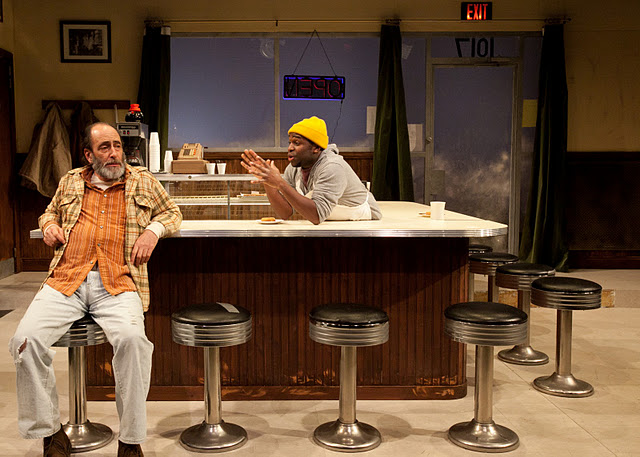Superior Donuts by Tracy Letts, Lyric Stage, 1/6/12-2/4/12, https://lyricstage.com/main_stage/superior_donuts/.
Reviewed by Craig Idlebrook
(Boston, MA) Allow me to digress right from the get-go and say that it’s worth the price of admission of Superior Donuts to watch Lyric Stage Producing Artistic Director Spiro Veloudos give his send-up of the standard fire-exits-and-cell-phones spiel before this play begins. A theater that sets loose a dry wit like Veloudos on the crowd before the play begins is bound to produce something worthwhile.
And Superior Donuts doesn’t disappoint. Armed a with script filled with razor-sharp dialogue and strong performances by Omar Robinson and Steven Barkhimer, this production delivers a tasty theater-performance that only has a few empty calories.
Set in a hold-out donut shop in Chicago’s Uptown district, Superior is all about urban dwellers finding, losing, encouraging and extinguishing hope. Arthur Przybyszewski (Will LeBow) arrives to find his donut shop has been vandalized. Despite an offer to sell his property for a good price to his ambitious Russian neighbor, Max Tarasov (Barkhimer), Arthur picks up the pieces to open again, not because of an indomitable spirit, but because he just can’t find the energy to quit. The donut shop is all the burned-out draft dodger has left.
Enter Franco Wicks (Robinson), a quick-thinking young man who overwhelms Arthur’s mental defenses as he talks his way into a job. Named after Franco Harris, the football player of “Immaculate Reception” fame, Franco’s hope is infectious as he careens around the shop and knocks away the rust from Arthur’s heart.
But the play doesn’t devolve into a rehashed Finding Forester kind of thing. Playwright Tracy Letts gives each of his characters the seeds of their own redemption and destruction. Because of this, nothing goes as planned, and the play has a nice unsettled vibe at the climax.
This production has serious flaws, including some performances that go more theatrical than for the gut. It’s as if the play’s director, Veloudos, told the actors to pull their punches, sometimes literally, as with a poorly-choreographed fight scene. And the blocking also sometimes left something to be desired, with too many backs to watch during dialogue.
But Letts’ writing carries the day. Through it, Barkhimer creates an uncomfortable character in the Russian neighbor Max, who both is a hero and villain in his desperate pursuit of the American dream. You never knew what you were going to get from Max any time he steps into the shop, and it makes the performance nicely gritty.
And Robinson seems to channel Letts directly as he verbally tap-dances around the shop as Franco, a young man who has seen enough to know better than to hope, but who does so anyway. Lucky for us, Letts never falls in love with Franco as much as the audience, which makes for a strong second half of the play.
If Dunkin’ Donuts could make a great whole-wheat donut, I would compare this play to it. It’s that sweet spot of entertaining, yet good for you.

